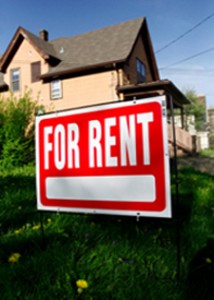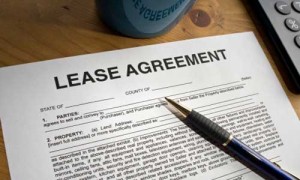Posted by Teresa on May 31, 2013 under Landlord Tips | 
 Stewart, who lives in Pennsylvania asked us what we know about the success rate of landlords whose rental properties are located hundreds of miles away. He was thinking about buying a single-family house in Florida, where he has a vacation home. “It’s priced right, and I’m down there a couple of times a year,” he said. “But I think I’ll be worried about not checking on my property enough.”
Stewart, who lives in Pennsylvania asked us what we know about the success rate of landlords whose rental properties are located hundreds of miles away. He was thinking about buying a single-family house in Florida, where he has a vacation home. “It’s priced right, and I’m down there a couple of times a year,” he said. “But I think I’ll be worried about not checking on my property enough.”
Stewart is right to be worried. While he can certainly hire a property manager to keep an eye on things, it’s usually better for landlords to have hands-on management of their rental property.
Why? For one thing, property management costs money. Showing the property, vetting applicants, running background checks and collecting rent take time, and for that you have to pay—and it will consume a portion of your profits.
As Stewart mentioned, another good reason to be a local landlord is because you can check on your property more often. Driving by to see if any strange (as in criminal) activities are going on, checking to see if security lights are on at night and having the opportunity to chat with tenants are all benefits of hands-on rental management. When tenants know you, the relationship is going to be better, and they might even take better care of your property!
Absentee landlords usually have more problems with their rental properties, although they don’t always know it. More parties, calls to police, trash piling up and uncut lawns tend to occur where landlords are not in the picture. Visibility means something, both to tenants and to the neighbors that have to live with your tenants!
However, if Stewart is going to buy the Florida property, he should hire a PM. It’s too risky to manage a rental property through the Internet and mail. The right property manager is worth the money they charge, if they can fill vacancies, find the best tenants and see repairs and maintenance are kept up.
Posted by Teresa on May 29, 2013 under Housing Trends | 
 Most landlords go the traditional route, with longer-term tenants who sign month-to-month, six-month or one-year leases. Keeping good tenants is the goal, but that is not always achievable. Turnover is sometimes the enemy, because it requires cleaning, repairs, advertising for new tenants, and vetting applicants.
Most landlords go the traditional route, with longer-term tenants who sign month-to-month, six-month or one-year leases. Keeping good tenants is the goal, but that is not always achievable. Turnover is sometimes the enemy, because it requires cleaning, repairs, advertising for new tenants, and vetting applicants.
But more landlords are seeking out vacationers who will rent their properties for a few days, a week or, if they’re lucky—a few months at the most.
Short-term vacation rentals are popping up in cities and towns that aren’t often thought of as vacation destinations, like Columbus, Ohio and Lincoln, Nebraska. Property owners advertise on sites like VRBO.com, where people searching for an alternative to hotels can easily find them.
For many travelers, a furnished apartment or home is a cozier alternative. If they have kids or pets, a vacation rental often works better than a hotel room. Families are renting homes in college towns for homecoming week or sporting events, or during the holidays to be near (but not with) family. Others are working in a town temporarily and need a place for a few months.
These property owners say that vacation rentals are ideal for their situation. They don’t want to deal with long-term renters, and they don’t mind the increased amount of paperwork and cleaning that comes with the territory. Besides, higher rents make up for it. Depending on location, vacation rentals can go for $100 – $500 per night and thousands per week.
One Columbus property owner rented her home for 140 nights at around $200 per night. Another focuses on weekend rentals, and is booked for around 45 weekends per year. The secret to success, they say, is hands-on management of the property.
If you’ve ever thought about renting your property as a vacation rental, check out sites like VRBO.com and HomeAway.com. Make sure you conduct background checks on renters, and ask other landlords about their experiences. It’s not for everyone, but the vacation rental business might be right for you!
Posted by Teresa on May 24, 2013 under Lease and Rental Agreements, Tenant Credit Checks, Tenant Screening & Background Checks | 

Okay, that’s a trick question. Why? Because your dream applicant shouldn’t “look like” anything in particular: not male, female, black, white, Asian, Catholic, Muslim, American, Russian or any other pre-determined profile. Using a prospective tenant’s race, color, religion, country of origin, gender, family status or disability to either approve or reject him or her for a lease is against the law, after all.
But there are several qualities that most landlords would probably agree make for a dream applicant:
- She can afford the rent: Smart tenants know how much of their take-home salary should go to their rent, utilities, car payment and other bills each month. Dream tenants only apply for rental housing they can afford.
- He has stable employment: A dream applicant is proud to present his employment history, because it shows he’s stable enough to hold down a job for longer than a month.
- She doesn’t balk at the tenant screening process: These days, smart tenants know that they will probably undergo tenant screening. And they appreciate the fact that you care enough about who lives in your rental property to require background checks for all tenants.
- He has a good credit history: The dream tenant has never been evicted, pays his bills on time and lives within his means. He’s not overextended on credit, is not going to have his car repossessed, and will most likely pay his rent on time each month. And, if his credit history is less than stellar, he has a co-signer lined up.
- She has great references: When you call a dream applicant’s former landlords and personal references, they all say good things. And they’re not her friends, co-workers or parents who are pretending to be former landlords!
Remember not to judge a prospective tenant by anything other than their ability to pay the rent and security deposit, and pass a background and credit check. And if you’re lucky, you’ll land a dream applicant who becomes a dream tenant!
Start your tenant relationship off right by knowing who you’re leasing to. Protect your rental property and assets with tenant background checks. Proper tenant screening will ensure you are leasing to the best possible tenants.
Posted by Teresa on May 23, 2013 under Landlord and Tenant FAQs, Landlord Paperwork and Forms, Rents and Deposits | 
 One of the biggest issues landlords and tenants seem to have is the handling of the security deposit. Smart landlords require them—and all landlords should. Here are some basic points about security deposits you should know and be ready to share with your tenants whenever questions arise.
One of the biggest issues landlords and tenants seem to have is the handling of the security deposit. Smart landlords require them—and all landlords should. Here are some basic points about security deposits you should know and be ready to share with your tenants whenever questions arise.
The security deposit is:
- Money collected up front to compensate for damages. At the termination of the lease, any repairs, cleaning fees or other expenses incurred to take care of damages outside ordinary wear and tear will be taken out of the tenant’s prepaid security deposit.
- Money collected up front to compensate for failure to pay rent, fees and late charges. In case a tenant fails to pay rent, fees or late charges, the landlord may get compensation from the security deposit.
- The best way to prevent financial squabbles between landlords and tenants. Once the tenant has moved out, it’s nearly impossible to chase him or her down to collect for lost rent or damages.
The security deposit is not:
- The last month’s rent. You should not allow a tenant’s security deposit to be used as the last month’s rent. They are two separate categories. Tell all tenants that they need to pay their last month’s rent, and after they are all moved out, you will conduct an inspection and walk-through to determine whether there are any damages to the property, and how much, if any, of their security deposit they will receive back.
- A savings account. Some states, such as California, require landlords to pay interest on security deposits held for at least a year, but most do not. California landlords may elect to hold the security deposit in an interest-bearing account or pay the interest established by a state commission. However, most states do not have the interest-paying requirement, and therefore, landlords may return all, a portion of or none of the security deposit to the tenant without any additional interest. Check your local and state laws.
- The landlord’s money. It is your tenant’s money, which you are holding as a small insurance policy against the possibility of loss due to damages or unpaid rent, fees or late charges. Smart landlords deposit tenants’ security deposits into separate accounts which they do not use for business expenses.
By the Way: It’s not up to the tenant to determine whether he or she has caused any damage. Checklists and photos of the rental unit on move-in day and move-out day are a great way to document any needed cleaning or repairs.
Posted by Teresa on May 17, 2013 under Fair Housing Act, Landlord Tips, Tenant Screening & Background Checks | 
 Being a landlord isn’t easy. It’s a challenging way to make a living or earn extra money. However, investing in real estate and leasing property can be quite rewarding when done right. Avoiding these common landlord errors can keep you out of legal trouble, and make things a little easier.
Being a landlord isn’t easy. It’s a challenging way to make a living or earn extra money. However, investing in real estate and leasing property can be quite rewarding when done right. Avoiding these common landlord errors can keep you out of legal trouble, and make things a little easier.
Using the same old lease, or someone else’s lease: Landlords who’ve been leasing properties for a long time often use the same lease for decades. And those who are new at it, often download a lease agreement off the Internet, or borrow one from a friend. It’s true that most leases contain common language, but it’s best to have yours customized for your property, your circumstances and your preferences. It could be well worth it to sit down with a landlord-tenant lawyer and have your lease reviewed.
Forgetting that time equals money: You might not mind doing repairs, cutting the grass or performing maintenance at your rental properties. If you’re an expert at these things, it could be cost-effective to do it yourself. However, if your work is sub-par, it takes longer than it should or requires follow-up repairs, you are probably wasting your time—and losing money. Hire experts to do the things you can’t do, and focus on what you do well. Fill empty units, update your website or take classes to make yourself a better businessperson.
Breaking anti-discrimination laws: You cannot refuse to rent to a prospective tenant based on race, national origin, religion, familial status, color, gender or disability. Landlords are not allowed to ask prospective tenants questions that refer to these things, either.
Basing acceptance of a tenant on anything other than cold, hard facts: Look at an applicant’s previous rental history, current and former employment, income, and credit worthiness. Run a background check to weed out those with criminal records. But don’t make decisions based on how a tenant applicant looks or dresses, or the car he or she drives.
Failing to follow the same procedures with every applicant: You could be accused of discrimination if you don’t require each applicant to follow the same process.
Making decisions based on emotion: Every experienced landlord has regretted allowing a tenant to be late on rent “just this once,” or to letting a tenant move in without paying a security deposit up front because they promised to pay “next month.” Well, “just this once” is never once and “next month” never comes. It’s difficult to be tough, but landlording is a tough business. If you want to succeed, you’ve got to take a hard stance.
Posted by Teresa on May 16, 2013 under Landlord Paperwork and Forms, Landlord Tips | 
 For apartment communities with swimming pools, safety is a concern for landlords and property managers. While some are obligated to follow specific state or municipal regulations, others are guided by common sense.
For apartment communities with swimming pools, safety is a concern for landlords and property managers. While some are obligated to follow specific state or municipal regulations, others are guided by common sense.
Regardless of whether you have to follow laws or regulations, you’ll want to review pool safety with all of your tenants, especially those with children. Use these tips to improve the safety around your community’s pool—and increase the fun for everyone this summer.
- Use clear signage: Not only do clear, legible signs help inform users of the rules, they can also help your case if there should be any problems with injuries or litigation. Posting signs that say “No Lifeguard on Duty,” “No Diving,” “No Access After Dark” and “Keep Gate Closed” are essential.
- Be sure that any guests or non-residents are accompanied by a tenant at all times. Consider selling guest passes for $2.00 or $5.00 per day to reduce the number of guests.
- Enforce a minimum age rule. Children under the age of 15, 16, etc. must be supervised by an adult.
- Don’t allow food or beverages in glass containers near the pool, to reduce the possibility of injury.
- Request that people with infections diseases, skin abrasions, cuts, or other injuries avoid using the pool.
- Do not allow pets inside the pool area.
- Keep trash receptacles close by and empty them frequently.
- Equip the pool area with safety equipment, such as life rings, life hooks and whistles.
- Compile a complete list of pool rules and warnings, include them with the lease, review them with new tenants, and have them initial the page at lease signing.
- Close the pool during inclement weather, especially during and after thunder/lighting storms.
Start your tenant relationship off right by knowing who you’re leasing to. Protect your rental property and assets with tenant background checks. Proper tenant screening will ensure you are leasing to the best possible tenants.
 Stewart, who lives in Pennsylvania asked us what we know about the success rate of landlords whose rental properties are located hundreds of miles away. He was thinking about buying a single-family house in Florida, where he has a vacation home. “It’s priced right, and I’m down there a couple of times a year,” he said. “But I think I’ll be worried about not checking on my property enough.”
Stewart, who lives in Pennsylvania asked us what we know about the success rate of landlords whose rental properties are located hundreds of miles away. He was thinking about buying a single-family house in Florida, where he has a vacation home. “It’s priced right, and I’m down there a couple of times a year,” he said. “But I think I’ll be worried about not checking on my property enough.”




